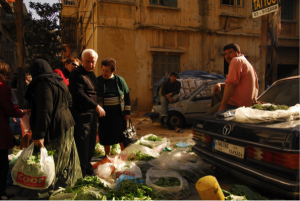
Asef Bayat. 2012. “Politics in the City-Inside-Out” City and Society 24, 2:110–128.
In cities such as Beirut and Cairo, the quiet everyday ways that poor people reappropriate space from the rich in the Middle East creates a new version of urban public space that Asef Bayat terms the “city-inside-out.” This new version of urban public space is one in which the city’s levels of public-ness mean that the city is, quite literally, inside out, a place in which poor people have no option but to have a heavy presence outdoors, on the streets, and in which the response of the rich is to seek their own exclusive and enclosed zones.
For the poor and disenfranchised the streets are central because they are simultaneously a place to express contention and an indispensable asset where economic and cultural life is reproduced. Bayat argues that in both of these ways people are involved in creating a set of “street politics.” These “street politics” take the form of conflicts over the control and use of public space and are also venues “where people forge collective identities and extend their solidarities beyond their immediate familiar circles” (120). Here slum settlements, street hawkers, and the urban disenfranchised form particular types of mobilization that Bayat terms “non-movements,” because they are “the collective actions of non-collective actors”(121).
As the streets are used by the urban poor for daily practices they become spaces where people “carve off, claim, and even push back elites from sizable pieces of the urban universe” (122). This occurs not only through physical control but also through the creation of social and political spaces that mean that the city is a place where the subalterns are overwhelmingly present in public arenas. This presence then is a way that the disenfranchised, who have been denied the benefits of urban citizenship, force elites to retreat into gated communities and locked vehicles and to hide behind private security guards. This art of presence is the way the disenfranchised reclaim the city.

